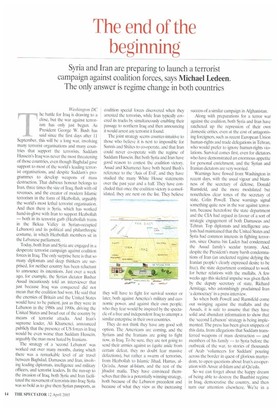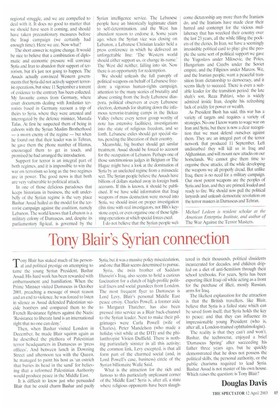The end of the beginning
Syria and Iran are preparing to launch a terrorist campaign against coalition forces, says Michael Ledeen. The only answer is regime change in both countries
Washington DC
The battle for Iraq is drawing to a close, but the war against terrorism has only just begun. As President George W. Bush has said since the first days after 11 September. this will be a long war, involving many terrorist organisations and many countries that support the terrorists. Saddam Hussein's Iraq was never the most threatening of those countries, even though Baghdad gave support to most of the world's leading terrorist organisations, and despite Saddam's programmes to develop weapons of mass destruction. That dubious honour belongs to Iran, three times the size of Iraq, flush with oil revenues, and the creator of modern Islamic terrorism in the form of Hezbollah. arguably the world's most lethal terrorist organisation. And then there is Syria, which has worked hand-in-glove with Iran to support Hezbollah — both in its terrorist garb (Hezbollah trains in the Bekaa Valley in Syrian-occupied Lebanon) and its political and philanthropic costume, in which Hezbollah members sit in the Lebanese parliament.
Today, both Iran and Syria are engaged in a desperate terrorist campaign against coalition forces in Iraq. The only surprise here is that so many diplomats and deep thinkers are surprised, for neither country has been reluctant to announce its intentions. Just over a week ago, for example. the Syrian dictator Bashar Assad incautiously told an interviewer that just because Iraq was conquered did not mean that the coalition had won. He said that the enemies of Britain and the United States would have to be patient, just as they were in Lebanon in the 1980s and 1990s, driving the United States and Israel out of the country by means of terrorist attacks. And Iran's supreme leader, Ali Khamenei, announced publicly that the presence of US forces in Iraq would be even worse than Saddam Hussein, arguably the man most hated by Iranians.
The strategy of a 'second Lebanon' was worked out over many months, during which there was a remarkable level of air travel between Baghdad, Damascus and Iran, involving leading diplomats, intelligence and military officers, and terrorist leaders, In the run-up to the invasion of Iraq, both Syria and Iran facilitated the movement of terrorists into Iraq: Syria was so bold as to give them Syrian passports, as coalition special forces discovered when they arrested the terrorists, while Iran typically covered its tracks by simultaneously enabling their passage to northern Iraq and then announcing it would arrest any terrorist it found.
The joint strategy seems counter-intuitive to those who believe it is next to impossible for Sunnis and Shiites to co-operate, and that Iran could never co-operate with the regime of Saddam Hussein. But both Syria and Iran have good reason to contest the coalition victory. Assad and Khamenei have both heard Bush's reference to the 'Axis of Evil', and they have studied the many White House statements over the past year and a half. They have concluded that once the coalition victory is consolidated, they are next on the list. They believe they will have to fight for survival sooner or later, both against America's military and economic power. and against their own people, who they fear would be inspired by the spectacle of a free and independent Iraq to attempt a similar enterprise in their own countries.
They do not think they have any good soft option. The Americans are coming, and the Syrians and the Iranians are going to fight now, in Iraq. To be sure, they are not going to send their armies against us (quite aside from certain defeat, they no doubt fear massive defections), but rather a swarm of terrorists, from Hezbollah to Islamic Jihad, Hamas, alQa'eda, Ansar al-Islam, and the rest of the jihadist mafia. They have convinced themselves that this is a potentially winning strategy, both because of the Lebanon precedent and because of what they view as the increasing success of a similar campaign in Afghanistan.
Along with preparations for a terror war against the coalition, both Syria and Iran have ratcheted up the repression of their own domestic critics, even at the cost of antagonising foreigners, such as recent European Union human-rights and trade delegations in Tehran. who would prefer to ignore human-rights violations. Survival comes first, even for dictators who have demonstrated an enormous appetite for personal enrichment, and the Syrian and Iranian dictators are very worried.
Warning have flowed from Washington in recent days, with the usual vigour and bluntness of the secretary of defense, Donald Rumsfeld, and the more modulated but nonetheless clear tones of the secretary of state. Colin Powell. These warnings signal something quite new in the war against terrorism, because heretofore the state department and the CIA had argued in favour of a sort of strategic engagement of both Damascus and Tehran. Top diplomats and intelligence analysts had maintained that the United States and Syria had common interests in fighting terrorism, since Osama bin Laden had condemned the Assad family's secular tyranny. And, despite the President's many harsh condemnations of Iran (an unelected regime defying the Iranian people's clearly expressed desire to be free), the state department continued to work for better relations with the mullahs. A few weeks ago this skeletal impulse was given flesh by the deputy secretary of state, Richard Armitage, who astonishingly proclaimed Iran 'a democracy' in a press interview.
So when both Powell and Rumsfeld come out swinging against the mullahs and the Assads, it is safe to assume that they have solid and abundant information to show that the 'second Lebanon' strategy is being implemented. The press has been given snippets of this data, from allegations that Saddam transferred weapons of mass destruction — and members of his family — to Syria before the outbreak of the war, to stories of thousands of Arab 'volunteers for Saddam' pouring across the border in quest of glorious martyrdom, to open questions about Iran's co-operation with Ansar al-Islam and al-Qa'eda.
So we can forget about the happy dream of being able to destroy the Baathist regime in Iraq, democratise the country, and then turn our attention elsewhere. We're in a
regional struggle, and we are compelled to deal with it. It does no good to mutter that we should have seen it coming, and should have taken precautionary measures before the Iraqi campaign (we certainly had enough time). Here we are. Now what?
The short answer is: regime change. It would be nice to believe that a combination of diplomatic and economic pressure will convince Syria and Iran to abandon their support of terrorism, but it's just not going to happen. The Assads actually convinced Western governments that Syria did not actively support terrorist operations, but since 11 September a torrent of evidence to the contrary has been collected. My favourite comes from Germany, where court documents dealing with Jordanian terrorists based in Germany recount a trip of theirs to Syria, where they were arrested and interrogated by the defence minister, Mustafa Talas. At tirst he suspected them of being in cahoots with the Syrian Muslim Brotherhood — a sworn enemy of the regime — but when he found out that their leader was in Tehran, he gave them the phone number of Hamas, encouraged them to get in touch, and promised he had arranged the introduction.
Support for terror is an integral part of both regimes, and it is impossible to win the war on terrorism so long as the two regimes are in power. The good news is that both are very vulnerable to political attack.
In one of those delicious paradoxes that keeps historians in business, the soft underbelly of the Syrian regime is the very place Bashar Assad hailed as the model for the terrorist campaign against the coalition, namely Lebanon. The world knows that Lebanon is a military colony of Damascus, and, despite its parliamentary fig-leaf, is governed by the Syrian intelligence service. The Lebanese people have an historically legitimate claim to self-determination, and the West has abundant reason to endorse it. Some years ago, when the Syrian vice was closing on Lebanon. a Lebanese Christian leader held a press conference in which he delivered an unforgettable line: 'The Western world should either support us, or change its name.' The West did neither, falling into sin. Now there is an opportunity for redemption.
We should unleash the full panoply of political weapons on behalf of Lebanese freedom: a vigorous human-rights campaign, attention to the many stories of brutality' and abuse coming from the lively Lebanese diaspora, political observers at every Lebanese election, demands for shutting down the infamous terrorist-training camps in the Bekaa Valley (where every terror group worthy of note has extensive facilities), investigations into the state of religious freedom, and so forth. Lebanese exiles should get special status, pending the liberation of their country.
Meanwhile, big brother should get similar treatment. Assad should be forced to account for the occupation of Lebanon. Perhaps one of those sanctimonious judges in Belgium or The Hague might have a look at the domination of Syria by an unelected regime from a minuscule sect. The Syrian people believe the Assads have billions of dollars stashed away in foreign bank accounts. If this is known, it should be publicised. If we have solid information that Iraqi weapons of mass destruction were moved into Syria, we should insist on proper investigation (this time with real investigators, not Blix's keystone cops). or even organise one of those lightning operations at which special forces excel.
I do not believe that the Syrian people wel
come dictatorship any' more than the Iranians do, and the Iranians have made clear their hatred and contempt for the vicious mullahcracy that has wrecked their country over the last 23 years, all the while filling the pockets of the clerics. In Iran, we have a seemingly irresistible political card to play': give the people the same sort of political support we gave the Yugoslays under Milosevic, the Poles, Hungarians and Czechs under the Soviet empire, and the Filipinos under Marcos. We, and the Iranian people, want a peaceful transition from dictatorship to democracy, and it seems likely to succeed. There is even a suitable leader for the transition period: the late shah's son, Reza Pahlavi, who is widely admired inside Iran, despite his refreshing lack of avidity for power or wealth.
As President Bush has said, this war has a variety of targets and requires a variety of strategies. No one I know wants to wage war on Iran and Syria, but there is now a clear recognition that we must defend ourselves against them. They are an integral part of the terror network that produced 11 September. Left undisturbed they will kill us in Iraq and Afghanistan. and will mount new attacks on our homelands. We cannot give them time to organise these attacks, all the while developing the weapons we all properly dread. But unlike Iraq, there is no need for a military campaign. Our most potent weapons are the peoples of Syria and Iran, and they are primed, loaded and ready to fire. We should now pull the political lanyards and unleash democratic revolution on the terror masters in Damascus and Tehran.
Michael Ledeen is resident scholar at the American Enterprise Institute, and author of The War Against the Terror Masters.



































































 Previous page
Previous page